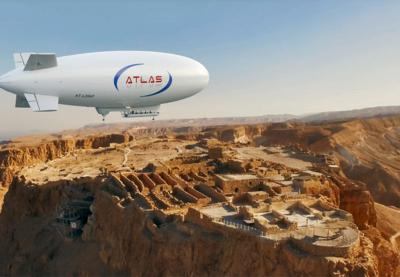Thu, Sep 10, 2020
This Location Allows Relatively Easy Transportation Of Materials And Components
Newly-established Israeli company, Atlas LTA Advanced Technology Ltd, has brought together leading experts from around the world in the unique field of lighter-than-air technology. The core team members have extensive experience in building airships and aerostats for all kinds of purpose, and together offer a solid technical background for the company’s current production activities and future developments.

Atlas's main goal is to introduce its green airships into everyday life, thereby reducing poisonous carbon emissions. The company is active in many fields, delivering practical, cost-effective solutions in the form of modern airships and aerostats. For example, Atlas-6/11 sightseeing airships are sparking curiosity at national parks and historic landmarks all over the world.
The advantages of the lighter-than-air technologies proposed by Atlas can also be clearly seen in the context of communications and surveillance missions. High altitude, long range, and unprecedented endurance of unmanned flight all contribute to making tethered aerostats or solar-powered airships a unique and highly-effective solution in several instances where traditional aircraft cannot be used. Besides the obvious economic advantages, their performance does not require the burning of any traditional fuel.
Atlas's flagship project is to build a new family of large-capacity transport airships, which will be capable of carrying oversized and overweight cargo of up to 165 tons, using safe helium buoyancy and dynamic lift made possible by low-emission hybrid-electric propulsion. Named ATLANT, this airship will significantly reduce transportation costs and will eventually change the world of cargo transportation. Since it does not require any special infrastructure, it can land in a desert, on water or even Arctic ice, making many hard-to-reach destinations much more accessible.
Based on the company’s latest innovations and practical achievements, this ambitious project applies important lessons learnt from its predecessors. Use of hydrogen as its fuel will make ATLANT the first zero-emission, large-capacity cargo aircraft. In the future, when the rules permit, it can be turned into a fully-autonomous unmanned cargo vehicle – the world’s largest UAV. The ATLANT is expected to be emission free within the next six to seven years.
More News
“The Russian side will obviously do everything to provide compensation and give legal assessment to all responsible officials’ action. Of course, these words related to>[...]
507 Aircraft Handed Over So Far This Year Airbus announced its deliveries in September set a record for the month with 73 aircraft handed off to 41 customers. Even though orders sl>[...]
Plans Approved For Replacement Carrier-Based Stealth Fighter The Pentagon has approved plans for the U.S. Navy’s next-generation carrier-based stealth fighter jet to replace >[...]
Nation’s Civil Aviation Minister Denies Complaints of the Captain’s Father Indian Civil Aviation Minister Ram Mohan Naidu has finally spoken out against claims of &ldqu>[...]
Owner Countersues For Vet Bills, FAA Investigating A dog owner who was being terrorized by a neighbor flying his drone low and around the dog to scare it, posted about his experien>[...]
 Aero-News: Quote of the Day (10.10.25)
Aero-News: Quote of the Day (10.10.25) Airbus Closes In On Annual Delivery Goal
Airbus Closes In On Annual Delivery Goal Pentagon Poised To Start Competition For Next-Gen F/A-XX
Pentagon Poised To Start Competition For Next-Gen F/A-XX Indian Investigators Accused of Manipulating Air India Crash Probe
Indian Investigators Accused of Manipulating Air India Crash Probe Drone Pilot Harassing Dog Sues Owner, Ends Up Paying
Drone Pilot Harassing Dog Sues Owner, Ends Up Paying



